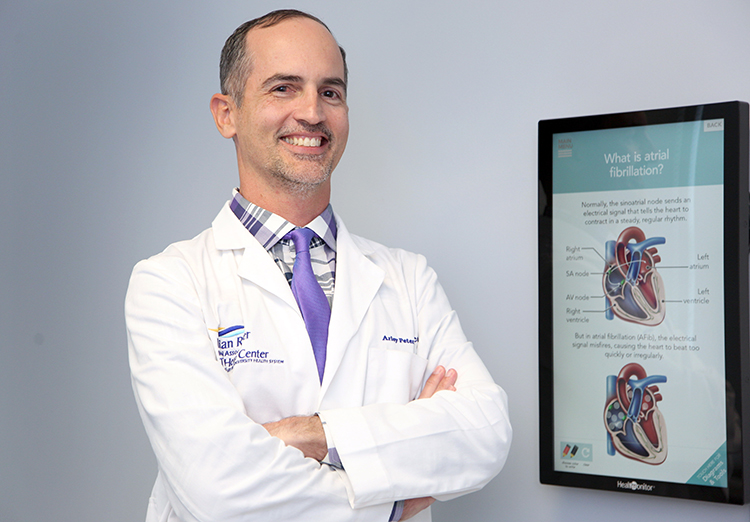
With the worldwide aging population characterized by a large influx of baby boomers, an epidemic of atrial fibrillation (AF) – an irregular and often rapid heart rate that can increase the risk of strokes and heart failure – is forecasted within the next 10 to 20 years.
AF is already the most common arrhythmia diagnosed in clinical practice today and as the population ages globally, it is predicted to affect 6-to-12 million people in the U.S. by 2050.
AF currently affects 3.8 percent of those older than 60 years, and 9 percent of those 80 and older. While identifying individuals at risk of developing AF is important, there is even stronger evidence that early detection and treatment of modifiable risk factors can reduce morbidity and mortality due to AF.
“Some people with AF have no symptoms and are unaware of their condition until it’s discovered in a physical examination or in many cases after they’ve already experienced a stroke,” said Dr. Arley Peter, who has been practicing cardiology in Indian River County since 2010.
“For those who have symptoms, the episodes may come and go. They may experience heart palpitations on Saturday night and be fine on Sunday morning. In those cases, we have to utilize a monitoring device that measures their heart rhythm over a period of time. Early detection is important because people with AF are five times more likely to have a stroke than people without the AF condition, and early treatment can prevent that from occurring.”
The heart rate in AF can be well beyond the normal range of 60 to 100 beats a minute for a normal heart. During atrial fibrillation, the heart’s upper chambers beat chaotically and irregularly out of coordination with the lower chambers. AF is so common that the World Heart Federation recommends routine screening for AF via pulse taking for patients over the age of 65, with or without known AF risk factors, with a follow-up ECG for those with an irregular pulse.
Anyone, of any age, who presents symptoms of heart palpitations, shortness of breath, dizziness, fatigue and weakness should have their pulse checked for irregularities. Although an irregular pulse may point to AF, an ECG is still required to confirm the diagnosis.
Untreated AF can lead to blood clots, stroke and other heart-related problems, including heart failure. Because the heartbeat is out of sync, blood can collect in the chambers of the heart.
When this happens, blood clots can form and travel to the brain causing a stroke. But having AF is not a death sentence. With the right treatment, patients can live a good life. The treatment will depend on your age, your symptoms and frequency of episodes, whether your heart rate is under control, your risk for stroke and other medical conditions.
“I can calculate their risk of having a stroke by evaluating their individual risk factors,” Dr. Peter said. “Stroke risk is not equal in all persons that have AF. The risks are higher if they are more than 65 years old or if they have diabetes, hypertension, coronary disease, heart failure or if they’ve had a stroke prior to the diagnosis. In that case I will be more proactive with that patient than with someone without underlying risk factors.”
There are a wide range of treatments for AF, with lifestyle changes, and heart rate and rhythm control the first lines of defense. Lifestyle changes include eating a healthy diet full of fresh fruits and vegetables, fiber-rich foods, lean meats and fish, and unsaturated fats like olive oil.
You should also exercise regularly, stop smoking, and limit alcohol and caffeine. Of course, managing stress and taking your medication as directed are also imperative.
In addition to lifestyle changes there are numerous medications and procedures that can prevent blood clots from forming or dissolve an existing clot, as well as restore the heart’s rate or rhythm. Aspirin and blood thinners/anticoagulants are often prescribed to prevent or treat blood clots and strokes. Other rate-controlling and heart rhythm-controlling medications are used to slow the heart rate during AF or return the heart to its normal rhythm and keep AF from returning.
Dr. Arley Peter graduated from medical school in Brazil and completed his resident training and cardiology fellowship at the University of Miami. He cares for his patients at the Treasure Coast Cardiovascular Institute and Cleveland Clinic Indian River Hospital. He is president of the Indian River Medical Society, Vice Chief of Cardiology at Cleveland Clinic Indian River Medical Center and Medical Director of the VNA. He also participates as Clinical Assistant Professor at the Florida State University Medical School. Dr. Peter welcomes new patients to his practice located at 787 37th St. in Vero Beach. Call 772-999-3996 to schedule an appointment.



